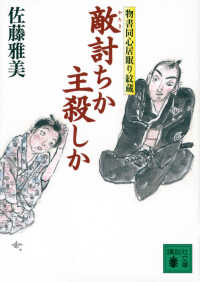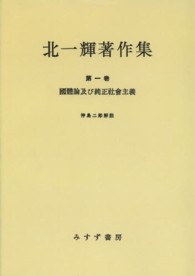- ホーム
- > 洋書
- > 英文書
- > Religion / Ethics
Full Description
Intellectual conflict between Early Christians and pagans was not uncommon during the first centuries of the Christian era, as is amply reflected in writings from this period. In this study, Brad Boswell deepens our understanding of the nature and aims of such conflict through a study of two key texts: Against the Galileans, by Roman Emperor Julian 'the Apostate,' and Against Julian, by bishop Cyril of Alexandria written nearly a century later. Drawing from Alasdair MacIntyre's philosophy of conflict between traditions, he explores how both texts were an exercise in 'narrative conflict' whose aim was to demonstrate the superior explanatory power of their respective traditions' narrative. Acknowledging the shared cultural formation between a pagan like Julian and a Christian like Cyril, Boswell challenges interpretive models emphasizing the points of commonality between the traditions. He offers a fresh approach to Julian's anti-Christian writings, provides the foundational analysis of Cyril's little-studied treatise, and invites reconsideration of the emerging Christian tradition within its intellectual contexts.
Contents
Introduction; 1. Traditions in narrative conflict; 2. Against the Galileans I: harmonizing Hebrew and Hellene; 3. Against the Galileans II: mapping apostasy; 4. Narrative structure of against Julian; 5. Episodes in rival narratives: 'Gifts of the Gods'; 6. Episodes in rival narratives: cosmology; 7. Case studies in rationality; 8. Discerning narrative conflict; Conclusion: narrative conflict and the incommensurability of traditions; Bibliography.








